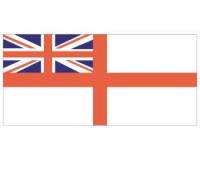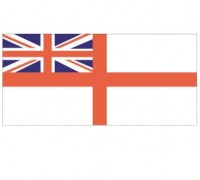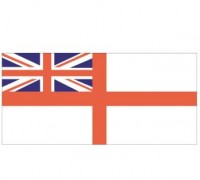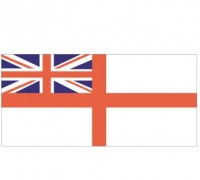ROYAL NAVY SOUTH ATLANTIC COMMAND - ROYAL NAVY C D 30 SHIPS *
28)DUNEDIN D 93 (LIGHT CRUISER)

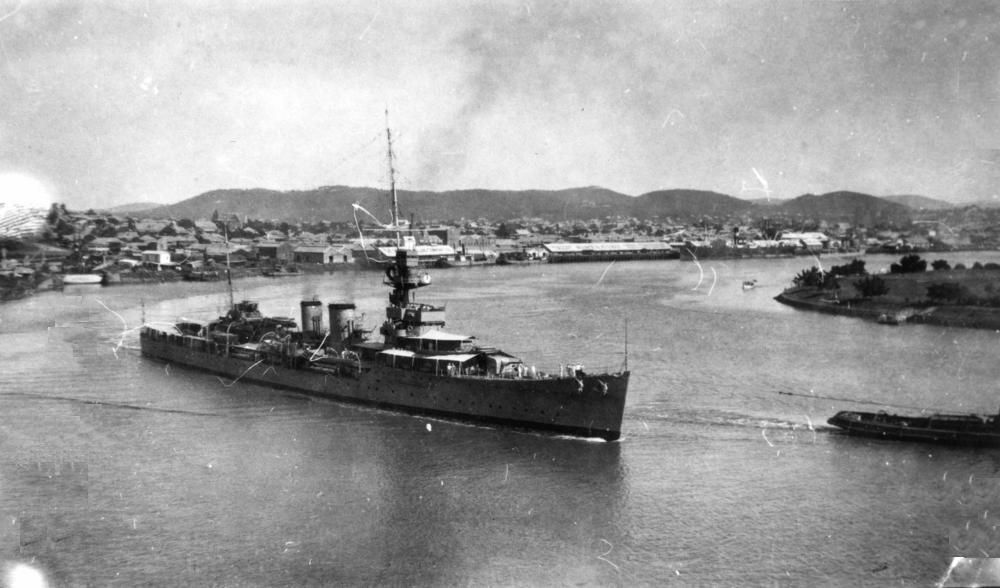
Photo.en.wikipedia.org

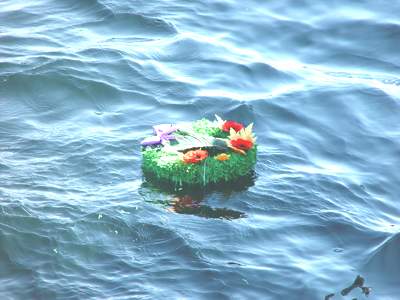
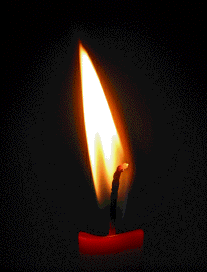
Completed 1919
Displacement 5603 tons Full
Length 445 ft
Beam 46 ft
Draught 14 ft
Propulsion Six Yarrow-type water-tube boilers Parsons geared steam turbines, Two shafts
Speed 29 kts
Complement 486
Armament 1918: six BL 6 in L/45 Mark XII on single mountings CP Mark XIV (152 mm) two 3 inch (76.2 mm) Mk II AA guns, two 40 mm QF two pounder "pom-pom" AA guns twelve 21 in (533 mm) torpedoes (4 triple launchers
Sunk 24 Nov 1941 by U 124 on pos. 03º 00’S 26º 00’W
419 Dead
67 Survivors
JAN 1941 Resumed convoy defence duties and available as Distant Cover for military Convoy WS5A which had been re-assembled. (Note: One source suggests that this ship rejoined the escort, for WS5A.arriving at Freetown on 6th January.) Atlantic convoy defence in continuation.
FEB 1941 Nominated for transfer to South Atlantic Command after routine docking. Took passage to Clyde for convoy defence in North Atlantic. 22nd. Deployed in NW Approaches after arrival in Clyde.
30 JUN 1941 Captured Vichy French freighter VILLE DE TAMATAVE east of St. Paul's Rock in the South Atlantic.
22 JUL 1941 Captured Vichy French freighter VILLE DE ROUEN east of Natal, Brazil.
In November 1941, the Admiralty learned from decrypted Enigma messages that the German armed merchant raider Atlantis (Schiff 16) (Kpt z.S. Rogge) and the supply ship Python operated in the South Atlantic and ordered the three cruisers HMS Devonshire (39), HMS Dorsetshire (40) and HMS Dunedin (D 93) to track them down independently.
On 22 November, HMS Devonshire (39) (Capt R.D. Oliver, DSC, RN) encountered the Atlantis, which was refueling U-126 (Bauer) north of Ascension. The raider scuttled herself and the U-boat was not able to attack the cruiser, but then started a rescue operation for the survivors.
Two days later the survivors were transferred to the Python, which was then ordered to refuel U-124. In the afternoon on the same day, U-124, on her way to the rendezvous, sighted the unescorted HMS Dunedin (D 93) (Capt R.S. Lovatt, RN), steaming a zigzag pattern at 17 knots east of St. Paul Rock. The U-boat raced ahead of the ship’s path and dived for a submerged attack.
The lookouts on the cruiser saw the periscope at 14.50 hours and changed course to chase the U-boat, but the course of the U-boat was misinterpreted so HMS Dunedin (D 93) turned away. The approaching U-124 suddenly came to the surface for a brief moment, but remained unseen.
The forward hydroplanes jammed and the LI had trouble to get the boat under control.
As Mohr was able to see through his periscope again the cruiser was not in sight, but then he spotted the vessel at a range of over three miles, which was now well past of a favorable attack range. Mohr decided to fire a spread of three torpedoes at 15.21 hours. After 5 minutes and 23 seconds, two torpedoes struck the cruiser, which rolled first to port then to starboard before sinking stern first after 17 minutes.
The first torpedo struck amidships and wrecked the main wireless station. The second torpedo struck further aft, probably near the quarters of the officers; dismounting the after 6in gun and blowing away the starboard screw. About 250 survivors managed to leave the ship by jumping overboard. They rescued themselves onto seven Carley floats and floating debris.
The U-boat surfaced and circled the survivors for about ten minutes but then left. Only 72 survivors were still alive on the six floats found by the American steam merchant Nishmaha, en route from Takoradi to Philadelphia, three days after the sinking. Many survivors drowned, some died of their injuries, others died of exhaustion and some were bitten and killed by sharks.
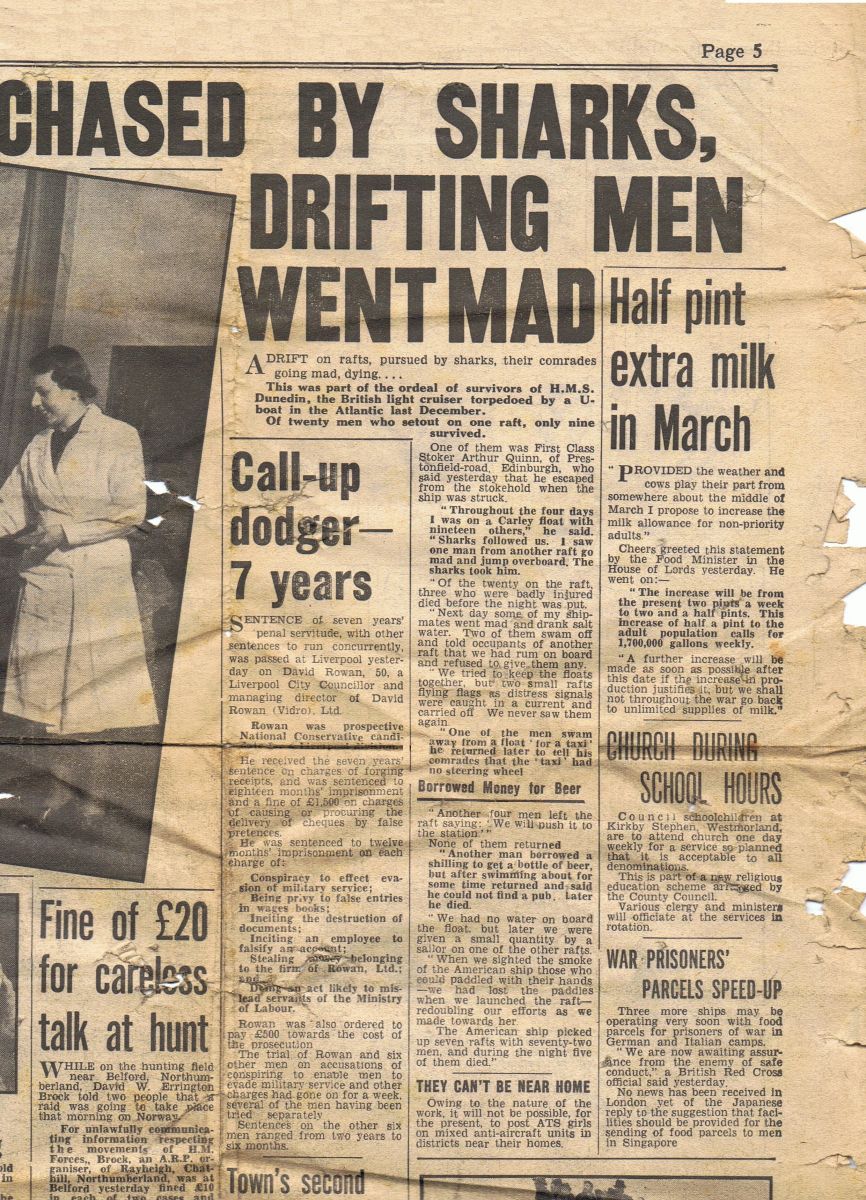
A British newspaper clipping portrays the sinking of HMS Dunedin as well as the terrifying saga of her crew against shark infested waters.
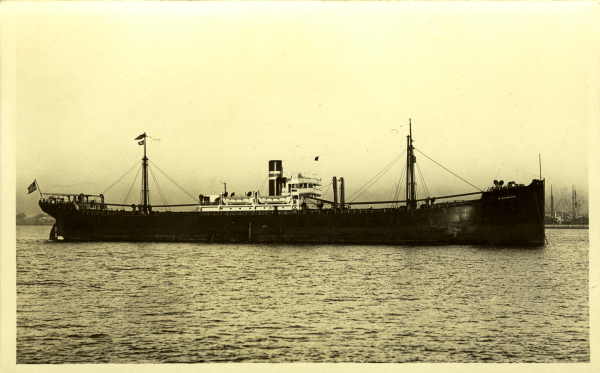
SS Nishmaha. Photo State Library of Victoria Australia. Image No: pc000706
Five of the rescued men died before the merchant ship reached Trinidad, thus only four officers and 63 ratings survived the sinking. On 1 December, the Python (Kptlt Lueders), refueling UA (Eckermann) and U-68 (Merten), was found by the third cruiser HMS Dorsetshire (40) (Capt A.W.S. Agar, VC, DSO, RN) in 27°53S/03°55W.
Both U-boat immediately submerged and UA fired five torpedoes at the cruiser but missed. The Python scuttled herself after the first shots were fired by the cruiser. An operation was started by both U-boats to rescue the 414 survivors from Python and Atlantis and took their floats in tow. Two days later, U-129 (Clausen) took over the whole crew of Python and U-124 (Mohr) joined the other boats on 5 December.
Between 14 and 18 December, the most survivors from Atlantis were transferred to the Italian submarines Luigi Torelli (KKpt de Giacomo), Enrico Tazzoli (KKpt Fecia di Cossato), Giuseppe Finzi (KKpt Giudice) and Pietro Calvi (KKpt Olivieri) and were taken to St. Nazaire. All survivors arrived in French ports between 23 and 29 December.
